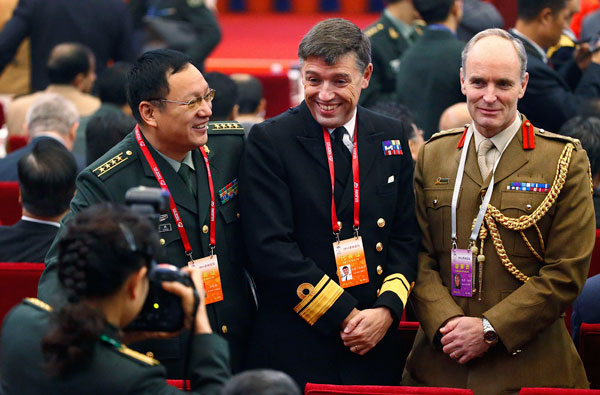Regional military chiefs hail Beijing's security proposal
By ZHANG YUNBI (China Daily) Updated: 2014-11-22 06:56
 |
|
Chinese military academic delegate Wang Yisheng talks to British delegate John Kingwell (center) and Observer Simon Levey during the Xiangshan Forum attended by senior officials and academics from Central Asia and the Asia-Pacific region in Beijing on Friday. PETAR KUJUNDZIC / REUTERS |
|
At a glance • Xiangshan Forum, first held in 2006, and initially staged every two years. Upgraded to an annual event this year. • About 300 delegates from 47 countries and four international organizations attending this year. • This year's theme is "Cooperation and Win-Win Build an Asian Community of Common Destiny". • Held from Thursday to Saturday, the forum discusses regional and maritime security and anti-terrorism cooperation. |
The proposal, put forward at a major defense policy forum in Beijing, won widespread acclaim from military chiefs and leading defense specialists in the region.
They said a liaison system has yet to be established to help the economically dynamic region tackle looming geopolitical concerns, and the proposal will help to resolve this.
In an address to the fifth Xiangshan Forum, State Councilor and Minister of National Defense Chang Wanquan said that China held 2,000 talks or meetings last year with neighbors on border issues.
China seeks to further enhance dispute management procedures, boost defense cooperation and "strengthen the regional security architecture", Chang said in a three-point proposal.
Singapore's Defense Minister Ng Eng Hen endorsed Chang's proposal and underscored the need to build an Asian security framework to set up meetings and cool any potential tension.
Malaysian Defense Minister Hishammuddin Hussein also backed Chang's proposal.
Yin Zhuo, director of the PLA navy's Expert Consultation Committee, said Asia-Pacific is "the only region in the world that still suffers from the wounds of the Cold War", and a security mechanism, like that established in Europe, has yet to be set up.
The forum provides a platform that "transcends different ideologies and involves all regional stakeholders", Yin added.
Some Western analysts have speculated that the China-led forum was upgraded from an event held every two years to an annual one earlier this year to steal the thunder from the Shangri-La Dialogue held in Singapore.
Singaporean Defense Minister Ng told Friday's plenary session that more opportunities for dialogue should be given to high-ranking military officials in the region, and meetings such as the Xiangshan Forum help to keep areas of tension from spiraling out of control.
Zhang Tuosheng, director of the Department of Research at the China Foundation for International and Strategic Studies, said China is a major player in the region, and "such platforms do not conflict with each other because they are working in concert to shape a safer region".
Ruan Zongze, vice-president of the China Institute of International Studies, said changing mindsets is important, adding that, "It may take quite a long time to shape a strong and popular belief of win-win cooperation."
Chang dismissed any connection between China's "justified" defense budget growth and allegations of "growing assertiveness" by China.
Military modernization "serves China's practical need to secure its own borders" Chang said.
He told the forum, "To defend our own security is a most direct contribution to security and stability in the Asia-Pacific region."
Andrei Kokoshin, director of the Institute for International Security Studies at the Russian Academy of Sciences and former secretary of the Russian Security Council, said the modernization of the People's Liberation Army is playing a positive role in boosting regional security and stability.
zhangyunbi@chinadaily.com.cn
- China, Russia pledge to strengthen military co-op
- Three-way military teamwork conquers Australian Outback
- Xi advocates new type of military relations with US
- President Xi advocates new type of military relations with US
- US, China agree to reduce possibility of military accidents
- China military reaches key decision to strengthen auditing
- China, Russia agree on military cooperation projects
- China steps up its military cooperation with Cameroon
- Govt encourages people to work 4.5 days a week
- Action to be taken as HIV cases among students rise
- Debate grows over reproductive rights
- Country's first bishop ordained in 3 years
- China builds Tibetan Buddhism academy in Chengdu
- Authorities require reporting of HIV infections at schools
- Typhoon Soudelor kills 14 in East China
- Police crack down on overseas gambling site
- Debate over death penalty for child traffickers goes on
- Beijing to tighten mail security for war anniversary







